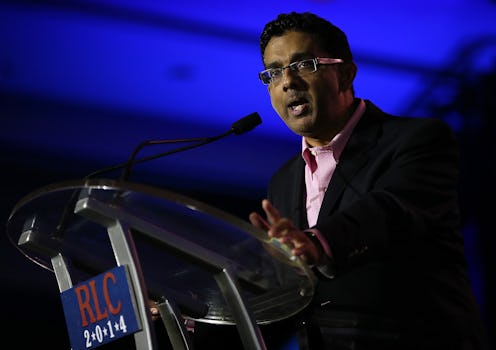News
What You Need To Know About The Right-Wing Troll Trump Wants To Pardon

Conservative author, filmmaker, and professional troll Dinesh D'Souza has been a strong supporter of President Trump since his unexpected political ascendancy. And now, the president has returned the favor. In a tweet posted Thursday, Trump announced he will pardon Dinesh D'Souza — but what did he do in the first place, exactly?
Back in 2014, D'Souza pleaded guilty and was convicted of campaign finance fraud. D'Souza had persuaded two other individuals to make $10,000 donations to the 2012 Senate campaign of Wendy Long, and then he reimbursed the donors for their contributions. Essentially, D'Souza knowingly exceeded the legal amount one person can donate to any political campaign, a charge he admitted to and apologized for in court hearings. At his sentencing, D'Souza received a fine of $30,000 and was assigned eight months at a community confinement center.
Many sympathetic observers — and D'Souza himself — argued that he had been a victim of political targeting. In a 2017 interview with Fox & Friends, D'Souza alleged that his status as a "conservative" had been a focus of the original case files. In a 2014 appearance on Face the Nation, Sen. Ted Cruz also came to D'Souza's defense, asking, "Can you imagine the reaction if the Bush Administration had went, gone and prosecuted Michael Moore and Alec Baldwin and Sean Penn?" Evidence has yet to materialize that political motivation existed.
And now, it seems Trump has bought the argument that D'Souza was wrongfully targeted. As his tweet states, D'Souza "was treated very unfairly by our government."
D'Souza isn't just the focus of controversy — he's highly adept at stirring it up. As Dylan Matthews outlined at Vox, D'Souza did not become "America's greatest conservative troll" for nothing. Although he graduated from Dartmouth, worked as a policy adviser in the Reagan administration, and was once a respected intellectual in elite conservative circles, D'Souza has morphed over the years.
In particular, D'Souza holds extremely controversial views about race in America, ideas that became more widely known to the public in 1995 with his book The End of Racism. Vox included several direct quotes from D'Souza's "incendiary" nonfiction opining on the topic of America's racial history, including D'Souza arguing that slavery was not a "racist institution" since it was "practiced for thousands of years in virtually all societies." D'Souza also wrote, "The main contemporary obstacle facing African Americans ... involves destructive and pathological cultural patterns of behavior."
In recent years, D'Souza has often come under fire for the content of his Twitter feed. In November 2013, D'Souza tweeted he was "thankful" that "America is big enough and great enough to survive Grown-Up Trayvon in the White House." His reference to Trayvon Martin, the unarmed 17-year-old black teenager who was shot and killed in 2012, implied that if Martin had survived and lived on, he would have turned out like Obama. Following the logic of D'Souza's tweet, that would be a real tragedy. As Jonathan Capeheart wrote at The Washington Post, D'Souza's "racist implications are beneath contempt."
D'Souza also jeered Parkland students filmed while watching a gun control bill get defeated in Florida's state legislature. He wrote on Twitter, "Worst news since their parents told them to get summer jobs," dismissing the trauma the group of minors had just survived. Then there was the meme D'Souza retweeted that labeled Obama a "gay Muslim" and insinuated Michelle Obama was actually a man. As MSNBC contributor Scott Dworkin points out on Twitter, these two D'Souza tweets — and many more offensive Twitter posts — are all from the past year alone.
That's no problem, apparently, for Trump, who shared with the world his unabashed D'Souza pardon announcement via that most public of mediums — Twitter.